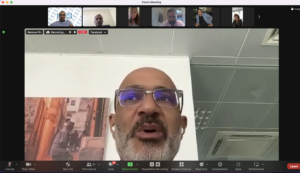The Dutch Ambassador expressed his deep regret about the continuation of horrific violations perpetrated against journalists in spite of the truce.
In an event organized by the Media Freedom Observatory (Marsadak),
The Dutch Ambassador expressed his deep regret about the continuation of horrific violations perpetrated against journalists in spite of the truce.
The Dutch ambassador to Yemen, Peter Derrek Hof, regretted the on-going violations against journalists and the press in Yemen, despite the existence of a truce between the conflict parties. This negatively and significantly affects media freedoms and the creation of a free and professional press.
 During an event organized by the Media Freedom Observatory to review the experience of the Dutch press in verifying information and reducing rumors, the ambassador of the Netherlands
During an event organized by the Media Freedom Observatory to review the experience of the Dutch press in verifying information and reducing rumors, the ambassador of the Netherlands
expressed his grief concerning the appalling practices and violations against Yemeni journalists. The latest violation was the killing of journalists Fawaz Al-Wafi and Saber Al-Haidari. Storming and stopping many radio stations and demanding them to pay fees are another form of violation.
Mustafa Nasr, chairman of the Media Freedom Observatory, stressed that the spread of fabricated information, especially in countries experiencing conflicts such as Yemen, represents a major challenge facing the press. It requires concerted efforts to support the independent media in order to enhance its confidence in front of the public.
He explained that through these events we, at the Media Freedom Observatory, seek to transfer the experiences of professional journalists in the Dutch press and to introduce the mechanisms to verify and check information.
The Executive Director of the Studies and Economic Media Center, Muhammad Ismail, confirmed that in light of the increasing need of the masses for information, journalists fall into the trap of rumors unintentionally, and, unfortunately, contribute in one way or another to their dissemination. He alluded to a previous report issued by the Center that revealed more than 450 rumors and cases of misinformation monitored during the last year by the platforms Fact and Sidq.
 Dutch journalist and NOS TV correspondent Daisy Mohr talked about her experience in verifying misinformation and false news in the Dutch media. She further said that many rumors spread from time to time in the Dutch media. She highlighted the efforts made by the Dutch media during the Corona pandemic to confront misleading news, and also reviewed the Dutch media’s experience in covering the war in Ukraine and how they work to confront the huge amount of disinformation and how a team verifies them around the clock.
Dutch journalist and NOS TV correspondent Daisy Mohr talked about her experience in verifying misinformation and false news in the Dutch media. She further said that many rumors spread from time to time in the Dutch media. She highlighted the efforts made by the Dutch media during the Corona pandemic to confront misleading news, and also reviewed the Dutch media’s experience in covering the war in Ukraine and how they work to confront the huge amount of disinformation and how a team verifies them around the clock.
Daisy added that it may be difficult for Yemeni media organizations to establish specialized teams to verify information, but the journalist may be able to play a role himself before publishing and jeopardize his credibility.
The event witnessed a number of interventions and questions by journalists, stressing the need for journalists in Yemen to get acquainted with state-of-the-art technologies and electronic mechanisms to detect misinformation. Currently the media is expressing a huge influx of false and fabricated information from the conflict parties, which represents a problem outside the remit of Yemeni journalists.
